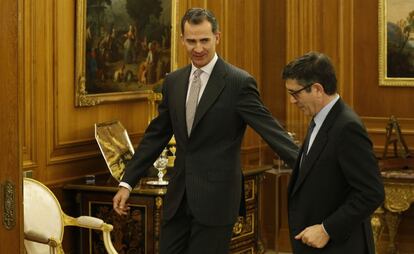Parties enter final stage of governing negotiations in weakened state
Time elapsed since the election, exhaustion and internal crises mark last stretch of talks

Spanish politicians have a month left to negotiate a governing deal that will avert a fresh general election in June.
But the more than three months that have elapsed since December 20 have taken their toll on all the main parties.
The fragmented scenario that emerged from that vote forced political leaders into a flurry of cross-party negotiations unprecedented since Spain returned to democracy after the Franco dictatorship in the 1970s.
Socialist leader Pedro Sánchez faces the dilemma of finding enough support from other forces or risk being replaced
But the winner of the December election, Mariano Rajoy of the Popular Party (PP), is completely isolated and has been unable to secure any support from other congressional groups to be reinstated as prime minister despite his 123 seats – 176 are needed for an overall majority.
His closest rival, Socialist Party leader Pedro Sánchez (90 seats), made an unsuccessful bid to become prime minister and now faces the dilemma of finding enough support from other forces or risk being replaced at the helm of his own party.
Sign up to our newsletter!
The EL PAÍS English Edition is launching a weekly newsletter. Sign up today to receive a selection of our best stories in your inbox every Saturday morning. For full details about how to subscribe, click here.
Meanwhile, Pablo Iglesias of Podemos is grappling with internal strife, and Albert Rivera of Ciudadanos no longer enjoys his original aura as leader of a fresh party.
The law stipulates May 2 as the deadline when parliament dissolves and new elections will have to be called. But so far no visible agreement is on the horizon.
Many possible outcomes
The leaders of PSOE and Podemos are scheduled to meet on March 30, but their significant differences make it unlikely that a deal will emerge from that encounter. Before this, Sánchez and Iglesias had already discussed ways to cooperate through a leftist coalition, but Podemos will not hear of an alliance that includes Ciudadanos, while the Socialists do not want to include regional forces that advocate independence referendums.
In fact, the only agreement to emerge out of this entire 99-day period is a “governing program” drafted jointly by the Socialists and Ciudadanos, who need backing from other parties to achieve the required majority, as their own joint congressional presence numbers just 130.
Meanwhile, the PP’s attempts to convince the PSOE and Ciudadanos to form a grand coalition are still stuck at square one.
Yet many political leaders have misgivings about a new election that would likely yield a similarly fragmented outcome. Pedro Sánchez is not even certain that he will still be the Socialist nominee, or whether Andalusian premier Susana Díaz might present a challenge to his leadership.
Many political leaders have misgivings about a new election that would likely yield a similarly fragmented outcome
It is also unclear whether Podemos would benefit from a new vote, considering that its regional partners in Galicia, Catalonia, Valencia and the Basque Country are lately expressing a desire to go their own way rather than run together again.
The PP has no obvious internal conflict, but that is because the conservatives lack a mechanism to discuss their own leadership. Rajoy refuses to step aside in favor of another candidate despite his complete rejection in Congress. In fact, for the last three months the PP has been simply sitting quietly and waiting for a new election.
Of the four main parties, Ciudadanos is the only one free from internal strife, but sources admit that these three months have somewhat eroded the party’s image as an emerging force that does not fit into the old left-right paradigm and instead advocates new versus old. Rivera’s deal with the Socialists could also make it hard to attract disaffected PP voters.
The countdown ends on May 2, when parliament will be dissolved if no deal is reached before then. In that case, Spaniards would be asked to vote again on June 26.
English version by Susana Urra.
Tu suscripción se está usando en otro dispositivo
¿Quieres añadir otro usuario a tu suscripción?
Si continúas leyendo en este dispositivo, no se podrá leer en el otro.
FlechaTu suscripción se está usando en otro dispositivo y solo puedes acceder a EL PAÍS desde un dispositivo a la vez.
Si quieres compartir tu cuenta, cambia tu suscripción a la modalidad Premium, así podrás añadir otro usuario. Cada uno accederá con su propia cuenta de email, lo que os permitirá personalizar vuestra experiencia en EL PAÍS.
¿Tienes una suscripción de empresa? Accede aquí para contratar más cuentas.
En el caso de no saber quién está usando tu cuenta, te recomendamos cambiar tu contraseña aquí.
Si decides continuar compartiendo tu cuenta, este mensaje se mostrará en tu dispositivo y en el de la otra persona que está usando tu cuenta de forma indefinida, afectando a tu experiencia de lectura. Puedes consultar aquí los términos y condiciones de la suscripción digital.








































